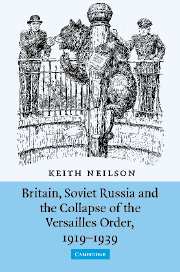Book contents
- Frontmatter
- Contents
- Acknowledgements
- List of abbreviations
- Introduction
- 1 The period of persuasion: British strategic foreign policy and Soviet Russia, 1919–1933
- 2 1933–1934: parallel interests?
- 3 A clash of sensibilities: January to June 1935
- 4 Complications and choices: July 1935–February 1936
- 5 Soviet Russian assertiveness: February 1936–July 1937
- 6 Chamberlain's interlude: May 1937–September 1938
- 7 Chamberlain as Buridan's ass: October 1938–September 1939
- Conclusion
- Appendix I
- Appendix II
- Appendix III
- Bibliography
- Index
2 - 1933–1934: parallel interests?
Published online by Cambridge University Press: 18 July 2009
- Frontmatter
- Contents
- Acknowledgements
- List of abbreviations
- Introduction
- 1 The period of persuasion: British strategic foreign policy and Soviet Russia, 1919–1933
- 2 1933–1934: parallel interests?
- 3 A clash of sensibilities: January to June 1935
- 4 Complications and choices: July 1935–February 1936
- 5 Soviet Russian assertiveness: February 1936–July 1937
- 6 Chamberlain's interlude: May 1937–September 1938
- 7 Chamberlain as Buridan's ass: October 1938–September 1939
- Conclusion
- Appendix I
- Appendix II
- Appendix III
- Bibliography
- Index
Summary
In the autumn of 1933, the ‘period of deterrence’ in British strategic foreign policy began. The bases of British strategic foreign policy since 1925 – arms control and the League – crumbled, but no replacement for these foundations was apparent. On 14 October 1933, Germany left the Disarmament Conference. This, and the suspension of the London Naval Conference in mid-December 1934, meant that a new arms race loomed. The League had approved the Lytton Report on 24 February 1933, and called on the Japanese to remove their forces from Manchuria. The Japanese had refused, had left the League on 27 March, and, instead, had signed the truce of T'ang-Ku with China two months later. This underlined the League's inability to deal with international problems, and Germany's own withdrawal from the Geneva body on 14 October 1933 made it clear that the Powers which favoured a revision of the settlement reached at Versailles were going to pursue it outside the bounds of the Covenant.
British policy makers were forced to reconsider how to deal with the revisionist Powers. One step was to determine Britain's military strength and deficiencies. Another was to attempt to limit the number of threats to Britain's position. Changes in Soviet policy began to make Moscow a possible (if not attractive) bulwark against aggressive revisionism. First, the Soviet government abandoned its policy of avoiding international entanglements, signed non-aggression pacts with many of its neighbours and hinted that it would be willing to conclude defensive alliances to deter Germany and Japan.
- Type
- Chapter
- Information
- Publisher: Cambridge University PressPrint publication year: 2005

